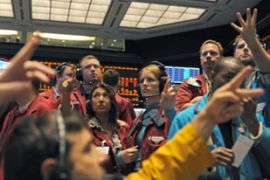Volatile markets continue slide
Asian stocks open lower after oil soars and Wall Street takes another beating.

Light, sweet crude for October delivery spiked as much as $25.45 to $130 a barrel on the New York Mercantile Exchange before falling back to settle at $120.92, up $16.37.
 |
|
Goldman and Morgan Stanley are the last of the “big five” investment banks [AFP]
|
An expiring crude contract that commonly causes prices to jump, added fuel to the frenzied spike in prices.
Still, the rally, which shattered crude’s previous one-day price jump of $10.75, set on June 6, showed the intensity of emotion in the market.
The severity of the price move shocked veteran market participants and prompted the US Commodity Futures Trading Commission to launch an investigation into whether illegal manipulation was to blame.
Crude has gained about $30 in a dramatic four-day rally that has at least temporarily halted oil’s steep two-month slide from a record $147.27 in July to below $100.
Gold prices also shot up, gaining more than $44.30 to settle at $909 an ounce and other commodities deemed safe rallied as well, underscoring investors’ uncertainly about the direction of the economy and their fear of more turmoil ahead.
The Dow Jones industrial index fell sharply on Monday, closing down more than 370 points, wiping out most of the gains made on Friday.
Bail-out uncertainty
The Bush administration and Democratic congressional leaders were locked in negotiations over details of the proposed government bail-out late on Monday.
| ‘King’ Henry |
|
Paulson had the same powers as his predecessors until a couple of weeks ago: oversight of the government’s taxation and fiscal policies. But as the financial storm erupted, with some institutions crumbling, sold or bailed out, Paulson’s new job description has changed substantially. If approved by congress, his rescue plan would give him sole control of a $700bn line of credit, and the power to use it to take on any bad mortgage-related debt he chooses. Congress, and the two main presidential candidates, John McCain and Barack Obama, have called for greater oversight of such powers. |
Hoping for swift approval from congress, the White House agreed to include mortgage help for troubled homeowners as part of the deal but remained deadlocked on other issues.
George Bush, the US president, prodded congress during the day to pass the rescue plan quickly.
He said negotiators had made “good headway” on the government’s $700bn bail-out plan but also warned that “failure to act would have broad consequences far beyond Wall Street”.
Al-Jazeera’s John Terrett, reporting from New York City, said investors, however, were no convinced that the plan was big enough or that the proposal would be approved in time or would work.
Investors fear that the government will have to dramatically ramp up borrowing to pay for the mammoth rescue effort, an inflationary move that could further devalue the dollar and trigger another surge in commodities prices.
Matt Zeman, the head trader at LaSalle Futures in Chicago, explained that the government is “going to have to continue auctioning off a whole lot of treasuries to finance these projects, so the dollar is going to suffer”.
“Right now it’s fear and anxiety driving people who want tangible assets,” he told The Associated Press.
US congressional leaders have endorsed the plan’s main thrust, saying passage might occur by Wednesday.
But they also want independent oversight and constraints on excessive executive compensation, Nancy Pelosi, the speaker of the house, said on Sunday.
Changing landscape
Henry Paulson, the treasury secretary, has been pushing legislators to approve the proposal as soon as possible.
Monday’s volatility came as the face of Wall Street continued to undergo sweeping changes, with Goldman Sachs and Morgan Stanley getting Federal Reserve approval to change their status.
Goldman Sachs and Morgan Stanley were the last surviving of the “big five” investment banks that shaped 20 years of Wall Street history after Lehman Brothers and Bear Stearns collapsed and Merrill Lynch was bought by Bank of America.
The move to become bank holding companies will allow the two to gain greater access to central bank funds and to open commercial banking subsidiaries or buy retail banks, meaning people can deposit money with them, greatly bolstering their resources.
